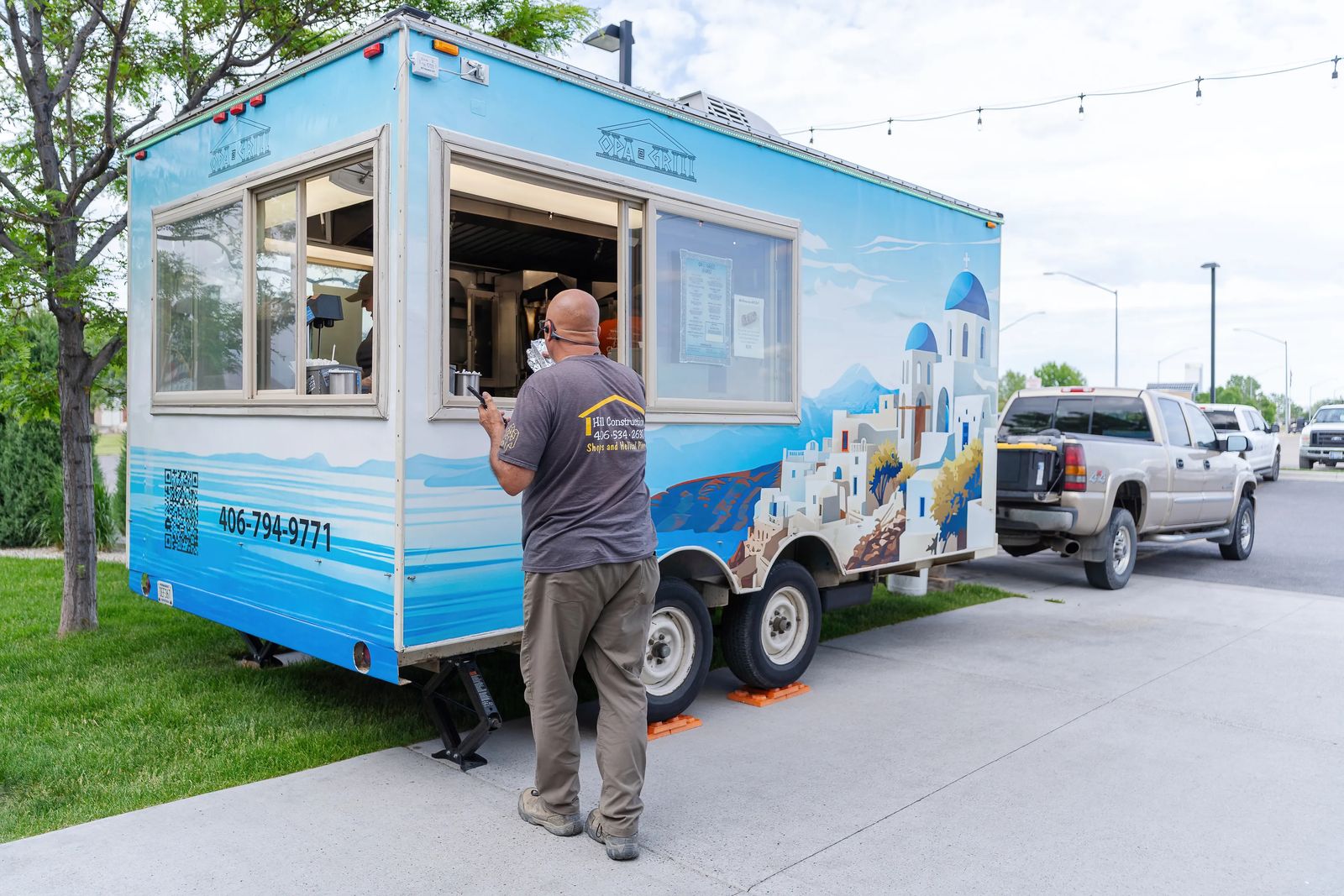
Rolling Success
Meet the Women Behind Billings’ Booming Street Food Scene
On a recent evening, tantalizing smells emerged from the colorful Mediterranean-themed food truck. Nicole Grovijahn hustled behind the window, cheerfully greeting customers while her husband, Brandon, chopped vegetables in between stacking up food orders. Set up in front of a downtown Laurel brewery, the line snaked around the pint-sized mobile kitchen, each person waiting for their slice of Greek goodness.
Nicole and Brandon have owned and operated Opa Grill for four years. It’s been a huge success since the beginning.
“Initially it was going to just be a side hustle,” Nicole says. “But it grew so quickly that we decided to go full bore and just do it. Our claim to fame is that Brandon will never let a customer go away hungry.”
Food truck followers have a lot of options when it comes to mobile meals in Billings. Choices vary from barbecue, burgers, and chicken to ethnic, deep-fried, and healthy — not to mention specialty trucks offering everything from smoothies, popcorn, and ice cream to coffee and kombucha.
According to Clark Snyder, program manager of the Environmental Health Department at RiverStone Health, there are more than 80 registered food trucks in the county. The brightly colored trucks and trailers set up around town also act as billboards and are hard to miss in parking lots, on street corners, in front of businesses, and as staples at events around the region.
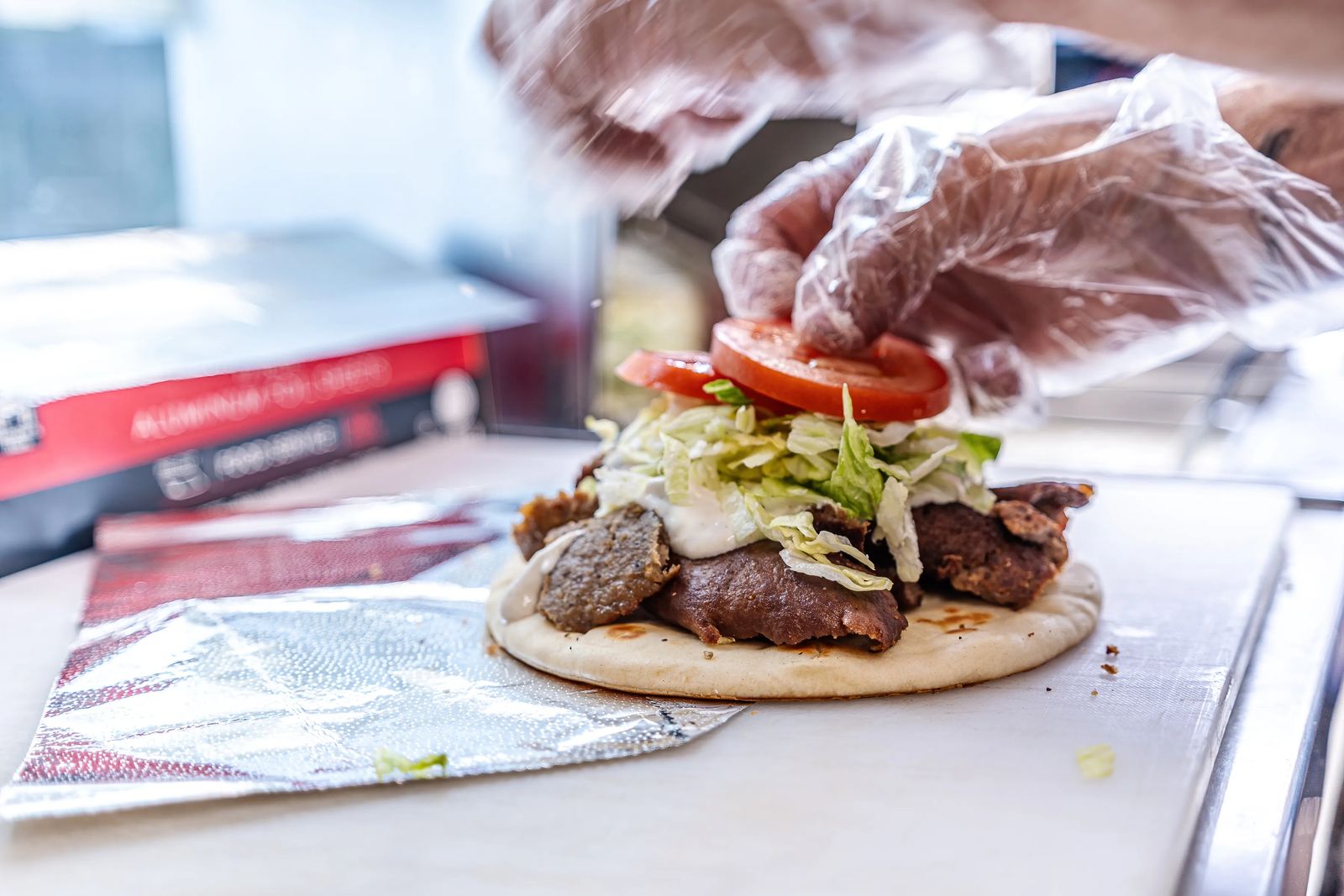
While food trucks have served Billings for years, there’s been a recent rise in popularity. Clark says there are two reasons for the increase. First, it’s affordable to operate, and second, having a business on wheels allows for travel to all types of locations.
“An owner can be up and running far more quickly and for far less cost,” Clark says, comparing the trucks to a brick-and-mortar business. “It’s not an easy business, but if the owners of food trucks find a niche in the market and are prepared to work hard, they will succeed.”
Though most are seasonal and provide supplemental income, many owners rely solely on their food truck income. Those hardy souls open their trucks whenever the weather allows — all year long. Others serve late into the fall, shut down for a few months, and then open back up as soon as the snow melts in spring.
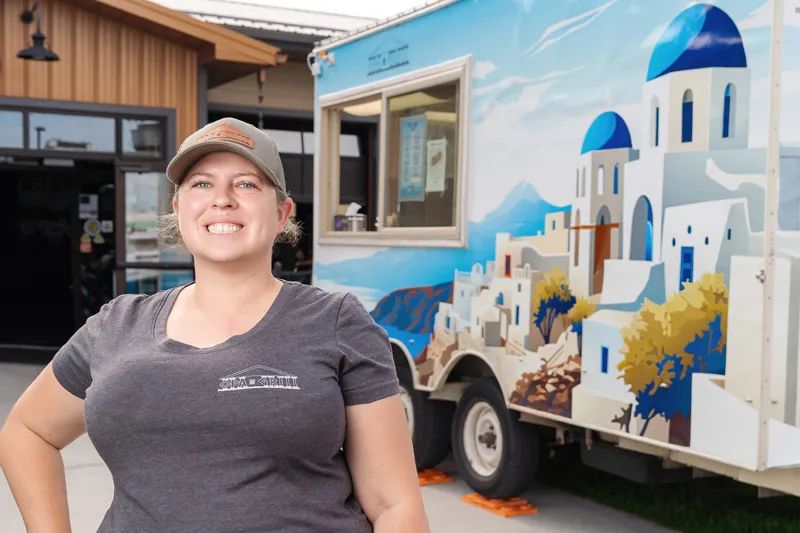
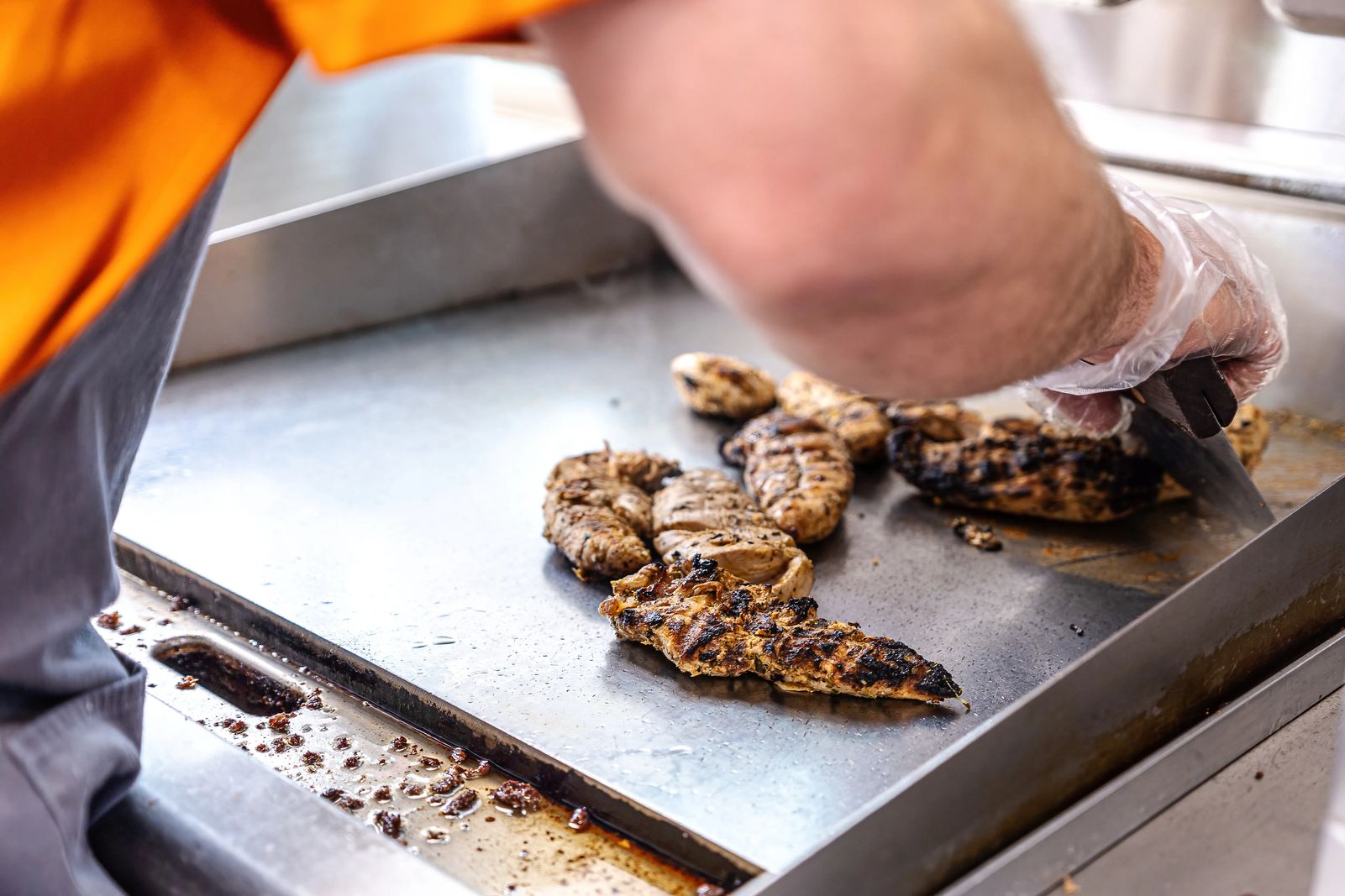
This was the first year the Grovijahns kept their food truck rolling all through winter. The decision proved to be profitable.
“We’ve had a good year so far,” Nicole says. “We don’t have any debt against our trailer and that’s helped.” Having saved money to buy a camper, when the opportunity arose to purchase the food trailer instead, the couple jumped at it.
Nicole and Brandon work together almost daily. When they aren’t selling from their trailer, they’re planning, prepping, and maintaining — making sure that every tool, machine, and surface of the trailer is clean and ready to go.
“It’s hard work. The idea of running a food truck is cool, but there’s a lot that goes on behind the scenes. Days off don’t mean we’re not working — it means we’re not selling from the trailer,” Nicole says. “When things get overwhelming, Brandon and I joke to each other, ‘We could be camping.’”
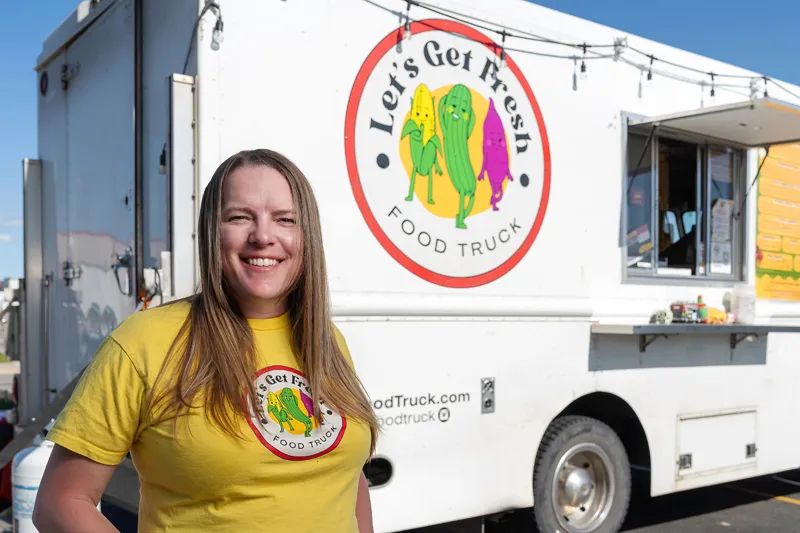
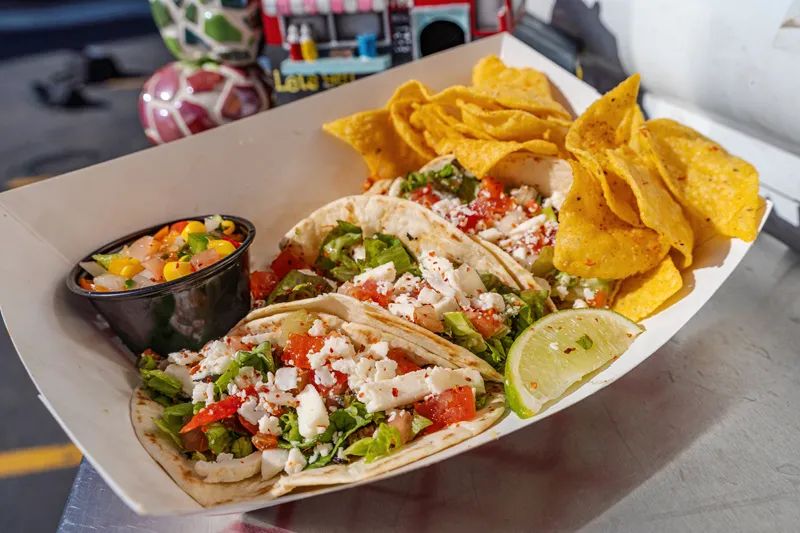
Sharli Swinehart and her husband, Tim, own and operate Let’s Get Fresh, a food truck known for its fresh produce. The tongue-in-cheek logo on the side of the truck, featuring three sexy vegetables, attests to Sharli’s playful personality.
In their fourth year of business, the couple has banked their reputation on serving wholesome tacos, salads, and wraps — all made right in the truck from fresh produce and ingredients.
“Fresh produce is the base for all of our dishes,” Sharli says. “And we appeal to those who are looking for healthy food or are on a restricted diet.”
Nicole and Sharli both say that it’s hard to get started in the mobile food industry. Deciding and outfitting a vehicle, startup costs, maintenance costs, licenses, insurance, food costs, and determining where to park and what events to attend all factor into whether it’s successful or not. On average, every hour spent selling out of the food truck takes up to another hour for shopping, prepping, and maintenance.
“There are so many things that can go wrong,” Sharli says. “From the outside it seems shiny, especially when there’s a long line of people waiting at your window. But what people don’t see is what goes into making that truck or trailer successful.”
Sharli and her husband bought their retired Snap-On Tools truck from a friend and did the build-out themselves. Five years ago, she never would have seen herself as a food truck owner, but like Nicole, she found the opportunity was too good to turn down. Sharli and Tim hire their teenagers to help them during busy events. “Our kids have done well helping us and we’ve grown into a successful business,” Sharli says. “The biggest concern we have is an engine problem. We love our truck. It’s easy to get in and out, and turns on a dime, but if there’s an engine problem, we’re out of business until it’s fixed.”
Just like her fellow food truck owners, it’s been several years of trial and error. What events will be the most profitable? Where can they gain a following? Through it all, they’ve homed in on their efficiency.
“Our business model is to let people come to us,” Sharli says. “We post our schedule on Facebook and our customers come to us. We also cater weddings, graduation parties, and company functions.”
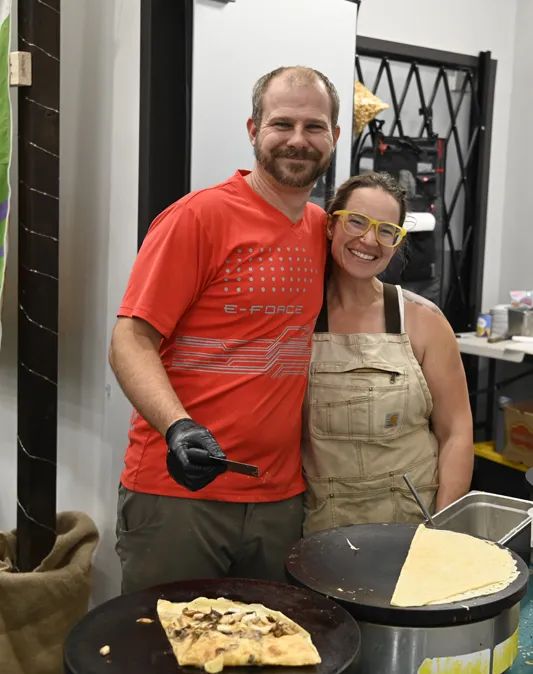

Long before food trucks were a common sight in Billings, Kate and Mo Bing had already captured the loyalty of locals with their pop-up crepe booth, called Crepe Diem. What started out as a hobby for the couple evolved into a profitable business they now run with their three children.
Their 15th season started in mid-May at the Bucking Horse Sale in Miles City. By the end of October, they will have worked at more than 100 events, ranging from private catering to the farmers markets in Billings, Bozeman, and Big Sky. Set-up starts several hours before the event begins, and operating the business takes up to 10 people working non-stop under their 10-by-20-foot canopy. Kate says moving the business into a truck or trailer was discussed, but in the end, they decided against it.
“We’re a different kind of mobile food business,” she says. “Crepes are so visible, people love to see how they are made. Being in a truck would rob them of that magic.”
At the Yellowstone Valley Farmers Market, a long line usually weaves down the street in front of their booth. During the four-hour market, the team can craft up to 600 crepes.
“We get a little nervous when the line gets long,” Kate says. “But long lines mean it must be worth the wait!”
Kate’s children help with operating Crepe Diem. When the family travels to the farmers’ markets in Bozeman and Big Sky, they live and work out of a specialized van.
“It’s a little tight sometimes,” Kate laughs, “but we make do!”
Last summer, their daughter, Talulah, 11, asked if she could expand the lemonade offered at the crepe booth into a separate stand next to Crepe Diem. That first year delivered success for her and her siblings.
“It’s been incredible to see how my kids have grown in their ownership,” Kate says. “They are learning the value of money and the skills of owning a business, and are a huge help to us.”
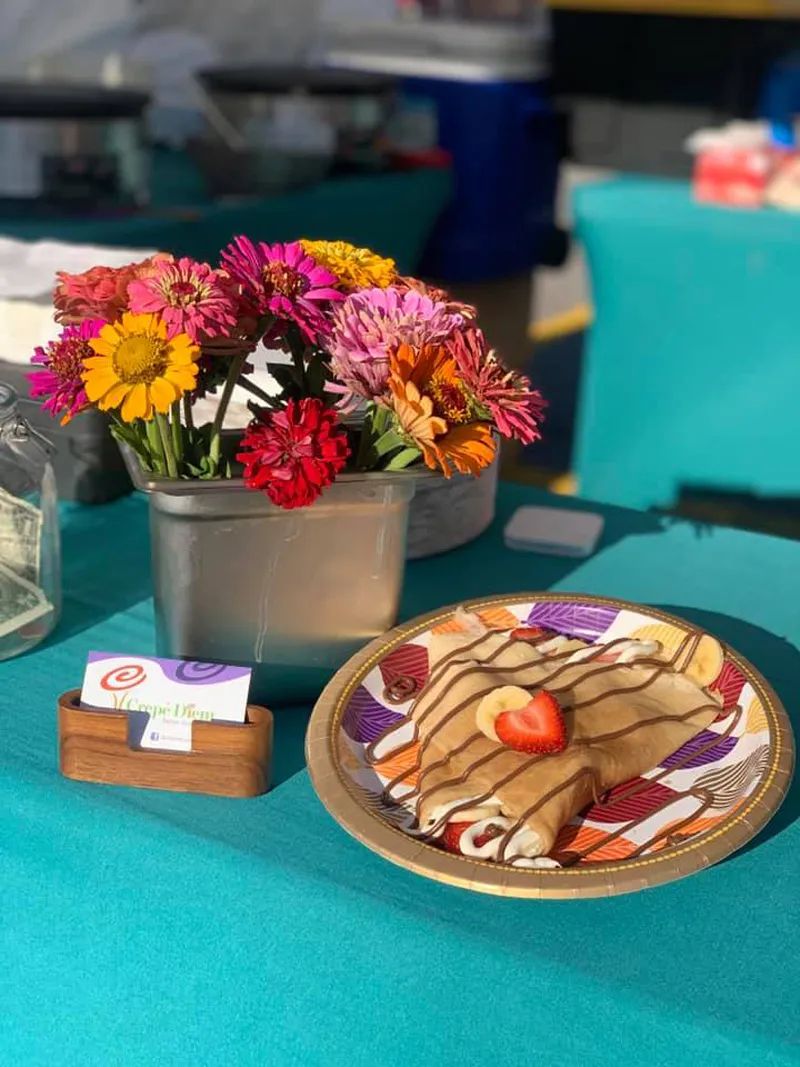
Consistency is key for all three business owners. Knowing which events to schedule, purchasing quality ingredients at the lowest cost, keeping their workspace clean and organized, and learning how to step away from the business for much needed breaks all play a role.
Crepe Diem is shut down from Nov. 1 to mid-May while Kate and Mo homeschool their children, ages 13, 11, and 9. Twice a year, Kate escapes with a friend to California, where they hike a 200-mile section of the Pacific Crest Trail, a hiking trail that spans from Mexico to Canada.
“Getting away and being alone in the wilderness, walking, sleeping in the dirt. It helps me to feel closer to God,” Kate says. “I like to push myself to see what I can accomplish on my own.”
The hard work and long hours that go along with owning a business don’t deter the women. They all love what they do. It’s also not uncommon to see them together at events. At the Great American Sheep Drive in Reed Point two years ago, once the food trucks were shut down, Sharli and Kate teamed up and won the log-sawing contest in the women’s division.
“Even though we are all competing with our food trucks, we still support each other,” Sharli says.
“We love pulling up to an event and seeing our friends’ trucks there, too,” Nicole adds. “We’re all in this together, and we want to see each other succeed.”











